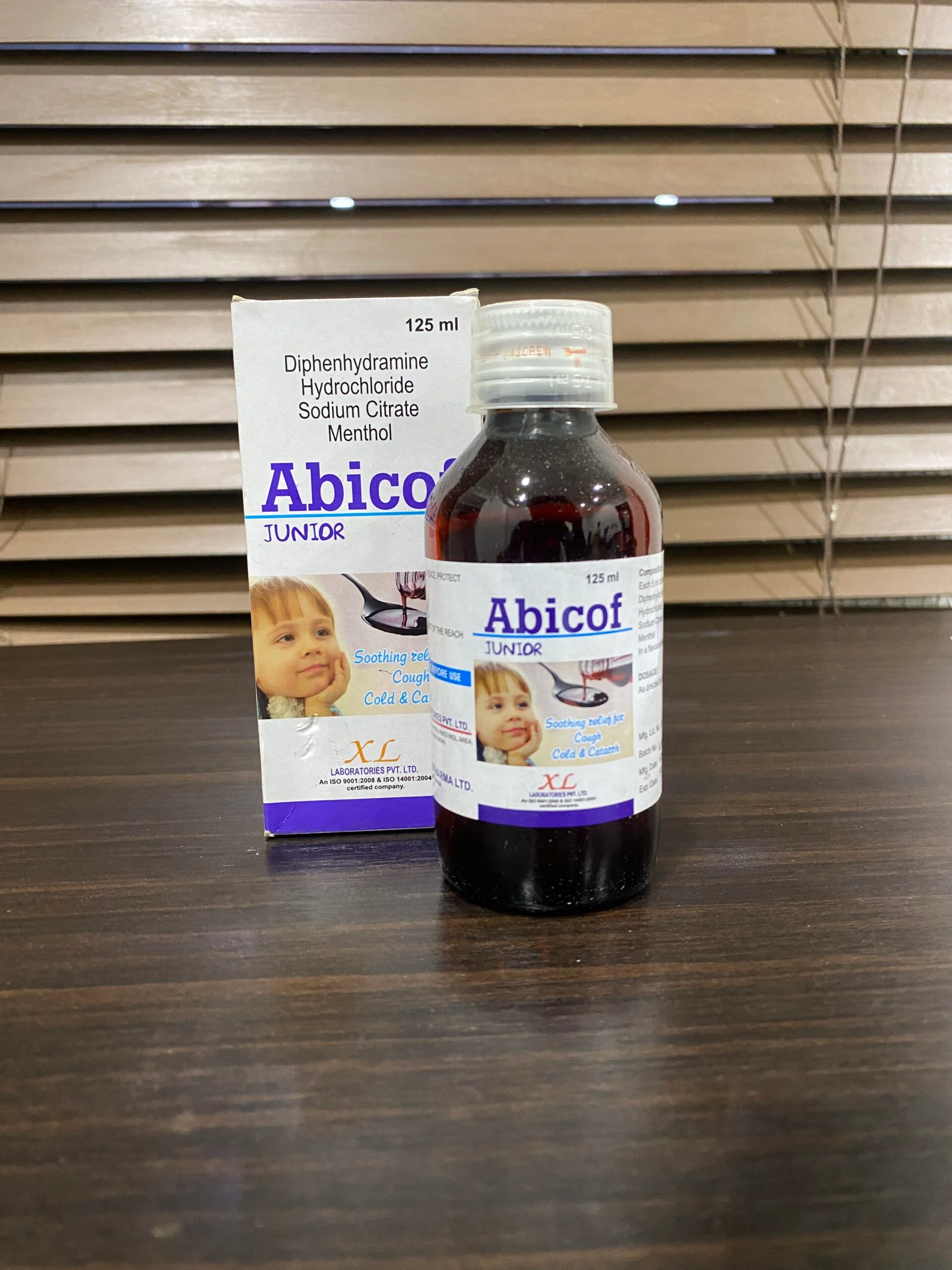Abicof Junior Cough Syrup: Effective Relief for Children’s Cough, Cold, and Flu Symptoms

Abicof Junior Cough Syrup: The common cough, cold or flu symptoms children have sometimes always pushes parents to the edge. These common ailments can make for sleepless nights with irritable children and panicky parents, not to mention discomfort for the little ones. Parents will be on the hunt for an effective way to get their child’s cough under control so that your little ones can go back to their regular everyday routine.
Abicof Junior Cough Syrup is designed to be a reliable solution for the common symptoms. The syrup uses active ingredients with the inclusion of natural extracts and honey that work to naturally soothe almost immediately while supplying additional benefits to suppress coughs if that’s the problem. This makes your child’s body feel comfortable enough to fall asleep without feeling uncomfortable from the cough.
Indications for Use
Children’s cough medicine can do an excellent job handling cough, cold, and flu symptoms. They can eliminate discomfort from fevers, knock out symptoms of congestion, and do a great job handling allergies. There isn’t much they don’t do, which is why they’ve developed a well-earned reputation for helping kids feel better.
However, these are all results that transfer over to incorrect impressions if not introduced in the proper settings. Whether a pharmacist, or a full-time dedicated pediatrician (hopefully, even both), it’s advised to have a sit down (as an inferior) to get talked down at/to by a professional before writing off the uses of any medicine as safe just because they look safe, never mind the side effects.
Dosage and Administration
I would suggest, for the average person, 1-2 teaspoons every 6 hours (when awake) for basic mild support of the immune response. And yes, taking it like this (4 times a day) as the constituents in thyme will be processed by the body fairly quickly… We want them to stick around and continue their good work all day long! This way the herb will always be in the system should this tricky virus decide to start an invasive procedure. So, take it as directed [every 6 hours]. Not 2-3 times a day. A good study guide takes you to the “edge”… But not over it causing discouragement!
*Keep your “solid” extracts (honey-based) in a “cool” pantry (but it doesn’t have to be “cold”). And latch the cupboard door to keep out the “little visitors”… Thyme has a strong scent! So don’t leave it near a window or stove area (or anywhere else the temperatures fluctuate).
Precautions and Contraindications
When talking about a drug, say a medication that is prescribed for some things as well. Let’s talk about a few things. For example, with well-known “contraindications,” like known allergies, severe hypertension, heart disease, etc.
- Having known allergies, hypertension, heart disease can all decrease patient safety and the drug’s effectiveness.
- So, there are populations of people that the drug is just not safe for — e.g., people with hypertension already that might get worse. People with known allergies that can potentially have an allergy attack. People with heart disease that can get worse or increase (any potential) for heart disease over time!
- You should know about the above from your patient’s record (or probably not even see the disease existing in the first place).
- The above list is generally a list of “precautions” (e.g., for children, or if you already know they are on drugs / taking drugs, have diabetes).
- However, the above implications are also demographic-specific (e.g., the population, or the disease, or the disease-focused as in
age'' orsex” or …). - For example, some drugs a (“normal”) person takes can increase the drug’s problems in the short-term (or, if taken for a longer time, during that longer time period, too).
- However, the above implications are also demographic-specific (e.g., the population, or the disease, or the disease-focused as in
- Different knowledge areas need to ensure they affect a person’s lifespan (in the “culture factor” section).
Potential Side Effects
Parents need to know the common side effects of their child’s medication, which can differ. The typical symptoms to look for are dizziness, drowsiness, dry mouth, nausea, and headache. These reactions can be light and more of just an annoyance, or they may prevent your child from being able to\\play or pay attention in school.
Watch your child daily and see how they react. Some side effects may not be physical looking and only come across to you as mood changes. Pay attention even closer and keep a daily log for best results. Talk to their healthcare provider with the log to pinpoint exactly what your child can do better on and where they should lower their current dose.
Understanding Cough, Cold, and Flu Symptoms in Children
Cough, cold, and flu are common illnesses in children with distinct symptoms. A cold typically results in a child experiencing a runny or stuffy nose, sneezed, and perhaps a mild cough. In contrast, flu symptoms may be similar to cold symptoms but are often much higher in intensity. The flu often causes high fever, body aches, and fatigue in addition to a runny or stuffy nose, plus the cough can be severe. It’s important for parents to be aware of these symptoms in their child’s early years so they can clearly communicate them with a healthcare professional.
Children benefit from appropriate illness treatment so they can recover quickly and turn their attention back to their learning and development. Like the body of adults, children may find relief from various medical symptoms in using over-the-counter medication, but they should get plenty of rest and drink plenty of fluids. To better guarantee a child’s normal health, he should ultimately speak to a healthcare professional about his symptoms or to ask any other questions he may have. The healthcare expert can then tell the child’s parents what he or she should be doing.
What is Abicof Junior Cough Syrup?
Abicof Junior Cough Syrup is an OTC formulation for children with a cough. A syrup is easier for the child to swallow, and sticks to the throat to provide additional topical relief. You may have more success in convincing your child to take cough syrup than a pill or tablet.
The dosage form is not as important as the accuracy of dosing itself, often solved by using a dose syringe, dose cup, prefilled delivery system, or dose cap, like the standard sizes that come with most over-the-counter (OTC) pediatric medications. Try them—really. OTCs are widely available, not only on a 24/7 basis, but you can’t beat the convenience factor: no insurance forms to fill out, and no high out-of-pocket deductibles.
Active Ingredients and Their Benefits
Another name you might hear paracetamol called is acetaminophen. People love using this drug because it treats two major symptoms: fever and pain.
How does it do that, you ask? Well, paracetamol inhibits your brain’s production of prostaglandins. Prostaglandins are “pain and inflammation” chemicals that hang out in your brain, among other places.
So, you’ll find most people using paracetamol for:
-Headaches.
-All mild-moderate pain (we’re even talking about arthritis pain here).
-Muscle aches.
-And in all adults and children products that aim to reduce a fever.
Phenylephrine HCl, with the “H” “Cl” hanging out on the end, is a decongestant. This drug will most often be used to treat one thing that’s related to the common cold or allergies: nasal congestion. The drug is so effective because it narrows the blood vessels in your nasal passageways, reducing your “stuffiness.”
And when you can breathe clearly through your nose, you decrease the presence of mouth and throat infections (which are gross), and you decrease how often you experience all the issues related to having a ton of secretions down the back of your poor little throat.
Chlorpheniramine Maleate is a teeny-tiny antihistamine that’s usually included in all the meds you’ll buy in the store. Why is it included? It’s effective, gives a little bit of sedative property, and treats a ton of symptoms:
-A runny nose.
-Sneezing.
-Itching.
Abicof Junior Cough Syrup is a medication made for treating symptoms of cough, colds, and the flu in kids. It is trusted and loved by customers for its sweet taste, which entices children to take their medicine. It’s helping in times of struggle when your child is sick and has a nipping cough.
Knowing that you have a bottle of reliable cough syrup on hand can help lessen the impacts of receiving some form of cold or flu. You will want to get on top of the symptoms at full speed, and Abicof Junior Cough Syrup is ready to assist the process safely and effectively.




![[DOWNLOAD] Working For My Good – Anny](https://gospelmusicbase.com/wp-content/uploads/2025/05/Working-For-My-Good-Anny.webp)